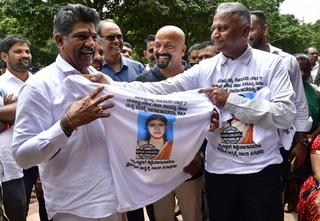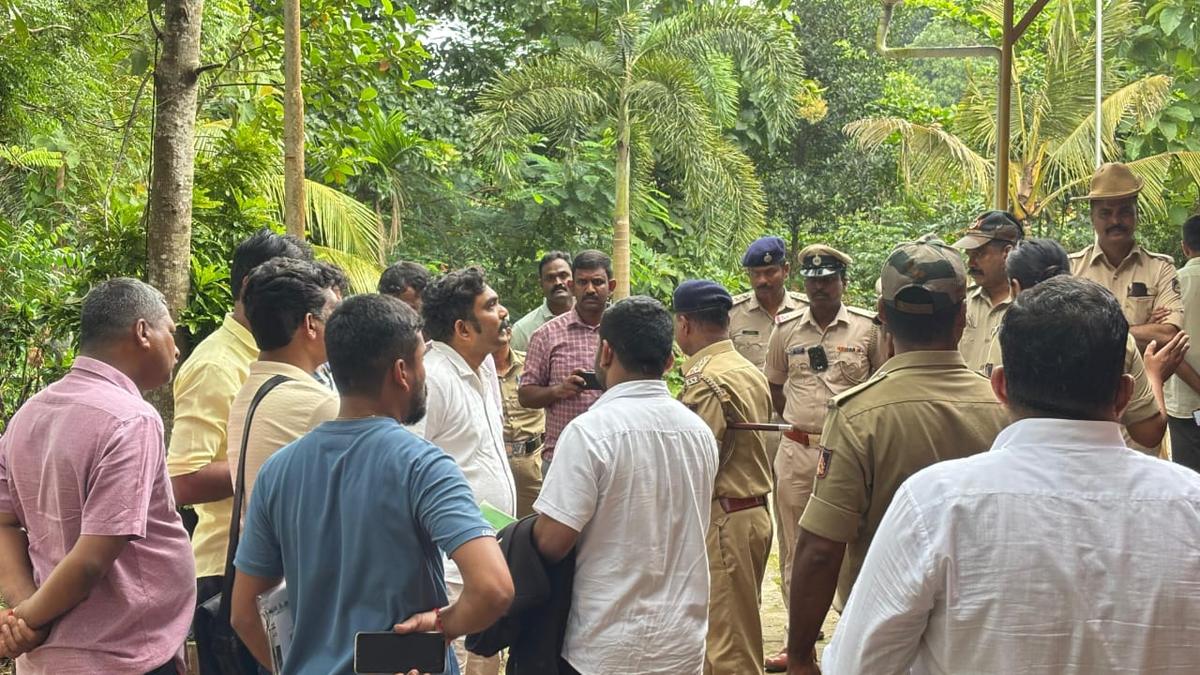In Karnataka, a high-voltage confrontation has unfolded after police booked Congress leader Girish Mattannavar and four others for allegedly obstructing the arrest of activist Mahesh Shetty Thimarody. The incident took place when authorities attempted to execute a legal warrant against Thimarody, but were met with resistance from Mattannavar and his supporters, who physically blocked the police. This dramatic showdown between law enforcement and political leaders has raised serious questions about the balance between the rule of law and political protest. Tensions escalated as both sides stood their ground, sparking widespread political and public reactions.
Police officials stated that their move to arrest Thimarody was tied to pending cases, and the obstruction was a direct violation of the law. They registered a case against Mattannavar and his associates under multiple sections for preventing lawful duty. However, Mattannavar and his supporters claim the government is deliberately targeting Thimarody for his outspoken views and activism on sensitive issues. The clash has triggered a wave of sympathy for Thimarody among sections of the public, while also inviting criticism for what many see as a politically motivated misuse of authority. This tug-of-war between governance and dissent has placed the spotlight firmly on Karnataka’s political stage.
Observers believe the case represents a wider narrative of shrinking space for activism and protest in the state. Opposition leaders have condemned the booking of Mattannavar, accusing the government of using intimidation to silence critics. Meanwhile, the ruling party has countered, stressing that the law must take its course regardless of political affiliations. With both camps digging in their heels, the confrontation now reflects the deepening political polarization in Karnataka. Analysts argue that the coming days may witness larger protests, court battles, and intensified rhetoric that could influence the state’s broader political dynamics.
Political Fallout Deepens
The arrest attempt on Thimarody and the subsequent booking of Mattannavar have led to a political storm across Karnataka. Opposition leaders have united in denouncing the police action, alleging it represents an attack on democracy and the right to dissent. They argue that Thimarody, known for his activism, has been unfairly targeted for standing up against government policies. On the other hand, the government insists that legal procedures must be respected and that no one is above the law. This clash of narratives has turned the incident into a rallying point for both sides.
Legal experts suggest the case raises important constitutional questions. While obstruction of arrest is punishable, they argue that the government must tread carefully to ensure it does not appear to be misusing its authority against critics. Activists point out that this is not the first time individuals have been booked for defending civil liberties, and they warn that repeated use of such tactics could erode public trust in institutions. With protests brewing and parties exchanging sharp barbs, the controversy is expected to intensify in both political and judicial forums in the weeks ahead.
The political battle has now spilled over into public discourse, with citizens divided on whether Mattannavar’s actions were justified. Some argue that obstructing the police undermines the rule of law and sets a dangerous precedent for future governance. Others, however, defend his stance, stating that when arrests are politically motivated, leaders have the moral responsibility to resist them. Social media has amplified these debates, with hashtags supporting Thimarody trending among his sympathizers, while others demand strict enforcement against those obstructing justice. The digital sphere has thus become a battleground reflecting the polarization seen on the ground.
The case has also placed the police in a difficult position. While tasked with implementing lawful orders, they face accusations of acting under political pressure, which undermines their neutrality. Senior officers have defended their personnel, saying the arrest warrant was part of due process and had no political undertones. Yet, critics question the timing of the attempt, arguing it was deliberately planned to create a spectacle and discredit opposition voices. This tug-of-war over perception highlights how law enforcement often becomes entangled in political controversies in highly charged environments like Karnataka.
Meanwhile, grassroots-level protests are beginning to take shape in support of Thimarody. Activist groups, student unions, and local organizations are mobilizing rallies, arguing that his voice represents marginalized sections often neglected by mainstream politics. These protests emphasize that silencing dissenters undermines democracy itself. However, state authorities maintain that protests cannot come at the expense of law and order. Already, there are reports of clashes between police and protesters, suggesting that the situation could escalate if not carefully managed by both political and law enforcement leadership.
The Opposition has seized the opportunity to corner the government, portraying itself as the defender of democracy and free expression. Leaders have been addressing public gatherings, warning that if dissenting voices like Thimarody’s are crushed, ordinary citizens could be next. They accuse the government of being intolerant to criticism and weaponizing police powers to maintain control. This messaging has struck a chord with many voters who feel alienated by the system. However, the government counters by accusing the Opposition of opportunism, claiming that they are only defending Thimarody because it serves their political interests.
Economically, the controversy is also raising concerns. Analysts argue that frequent political conflicts and protests disrupt Karnataka’s image as a business-friendly state. Investors, both domestic and international, often factor in stability when making decisions. Repeated political agitations can send worrying signals about governance. While this particular issue may not immediately deter investments, prolonged unrest or perceived authoritarianism could hurt Karnataka’s credibility in the long term. Thus, the government faces not just political, but also economic stakes in how it handles this unfolding crisis.
Larger Implications for Karnataka’s Democracy
At its core, the incident is more than just a law-and-order issue; it symbolizes the growing tension between activism, politics, and governance in Karnataka. By booking Mattannavar and others for resisting Thimarody’s arrest, the state has reignited debates about freedom of protest and the thin line between legal enforcement and political vendetta. As the case unfolds, it is poised to shape the discourse on democracy, dissent, and accountability in Karnataka for months to come.
The legal battle is expected to intensify in the courts as Mattannavar and the others prepare to contest the charges. Lawyers representing the accused are likely to argue that their actions were not an obstruction but an act of peaceful resistance to what they see as unjustified state action. They may also challenge the validity of the arrest warrant against Thimarody itself, bringing the legality of the government’s approach under judicial scrutiny. Legal experts predict that the case could become a precedent-setting moment in defining the boundaries between lawful protest and obstruction of justice in India.
Civil society organizations have also weighed in, warning against a growing pattern of criminalizing dissent. Human rights groups argue that the use of obstruction charges against political opponents reflects a worrying erosion of democratic freedoms. They cite past incidents across India where dissenters, journalists, and activists have faced similar charges, claiming that the Karnataka case is part of a larger national trend. These voices are urging the judiciary to uphold constitutional protections and prevent the misuse of criminal law for political ends. Their interventions have given the case wider visibility beyond Karnataka’s borders.
Religious and community groups are also divided in their response. While some have condemned the government’s actions as undemocratic, others insist that the law must be respected, regardless of political or activist backgrounds. This split in opinion is evident in local forums, temples, and neighborhood meetings where people passionately debate the issue. For many, the case is not merely about politics, but about values of justice, fairness, and morality. Such widespread discussions suggest that the incident has deeply resonated with citizens at all levels of society, not just political elites.

For Thimarody himself, the developments could redefine his political and activist career. Supporters believe the government’s actions will only make him more popular, portraying him as a victim of oppression and a defender of democratic rights. Already, his profile has risen significantly, with media coverage highlighting his past activism and commitment to social causes. However, critics warn that associating too closely with defiance of the law could damage his credibility among moderate voters. The outcome of the legal and political struggle will likely shape his future trajectory in Karnataka’s political landscape.
Looking ahead, the case is poised to become a litmus test for the government’s ability to balance law enforcement with democratic freedoms. If it pushes too hard, it risks alienating voters and strengthening the Opposition. If it appears too lenient, it could be accused of weakness in upholding the law. This delicate balancing act makes the situation particularly challenging for Karnataka’s leadership. As the legal proceedings continue and protests gather momentum, the entire state will be watching closely to see how this confrontation evolves and what it reveals about the state of democracy in Karnataka.
Follow: Karnataka Government
Also read: Home | Channel 6 Network – Latest News, Breaking Updates: Politics, Business, Tech & More


